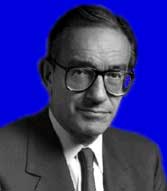|
|
|
| Nipawin - January 5, 2001 - by: Mario deSantis | |
|
speculative purposes |
A relevant number of economists are suggesting that too much money is being used for |
| speculative purposes. Also, many economists are realizing that new statistics should be | |
| designed to measure the performance of our changing economy. To attest the importance | |
| for needed changes in our economic system, we can reflect on what happened yesterday | |
| when the Federal Reserve Board took the decision to cut their banking lending rate by | |
| half a per cent to 6%. As a result of the lower US interest rate, the Toronto Stock Exchange | |
| jumped 3.79%, the Nasdaq composite index soared 14.17% while the Dow Jones Industrial | |
| average jumped 2.81%(1). So with a single move to cut the interest rate by half a percent, | |
| Alan Greenspan, chairman of the Federal Reserve Board, created in a single day a lot of | |
| wealth, not only in the US and Canada but all over the world. | |
|
|
|
|
walk on |
Greenspan reduced the interest rate to offset an expected recession, and many financial |
| analysts have had many comments about his monetary policies of following bogus textbook | |
| theory. As my son James got the news that Greenspan cut the interest rate, he told me about | |
| it and he commented how in the world people can be that stupid and believe that wealth was | |
| created all at once instantaneously. And I replied, "James, what can you do, many people | |
| today are just copycats, they just have a herd mentality." So, Greenspan has saved the world | |
| economy, the stock market and as a consequence he has been hailed as close to God, being | |
| able to walk on water and part the waves(2). | |
|
|
|
|
shut up |
Now, to show the idiotic brainwashing mentality of our financial people, I want to report the |
| following reaction of Fred Ketchen, a stock market analyst with Scotia MacLeod, "The more | |
| we talk about [recession] the more likely it will happen... It's best to just shut up about it(3)" | |
| So, at the time researchers are dismissing optimism as a formula for success(4), our economy | |
| and financial world continue to be guided by greedy speculators making money in the name | |
| of an optimistic view of the economy and of the future. By the way, where is the free market | |
| and the supposed Invisible Hand(5)? | |
| ------------------Endnotes: | |
| List of relevant social articles http://www.ftlcomm.com/ensign | |
| Fed rate cut ignites markets, Jacqueline Thorpe, January 4, 2001, Financial Post | |
|
|
|
| He walks on water and turns the tide. Greenspan's big gesture, William Hanley, January 4, 2001, Financial Post | |
|
|
|
| U.S. rate chop rescues markets. Canadian analysts move to counter recession fears, Peter Morton, National Post, with files from Southam News and Reuters, January 4, 2001 | |
|
|
|
| Seeing Pessimism's Place in a Smiley-Faced World, By ERICA GOODE, August 15, 2000, NY TIMES. This article deals with Dr. Barbara Held's book "Stop Smiling, Start Kvetching" | |
|
|
|
| Biography of Adam Smith (1723-1790), Adam Smith wrote "The Wealth of Nations." He is most often recognized for the expression "the invisible hand," which he used to demonstrate how self-interest guides the most efficient use of resources in a nation's economy, with public welfare coming as a by-product. However, Smith's belief in the invisible hand was questioned when at the time of his death on July 17, 1790, it was discovered that Smith had devoted a considerable part of his income to numerous secret acts of charity. Yet, our conventional economists identify Adam Smith as the true believer of "The Invisible Hand," that is capitalism, whatever capitalism is for our conventional economists. http://odur.let.rug.nl/~usa/B/asmith/adams1.htm | |
